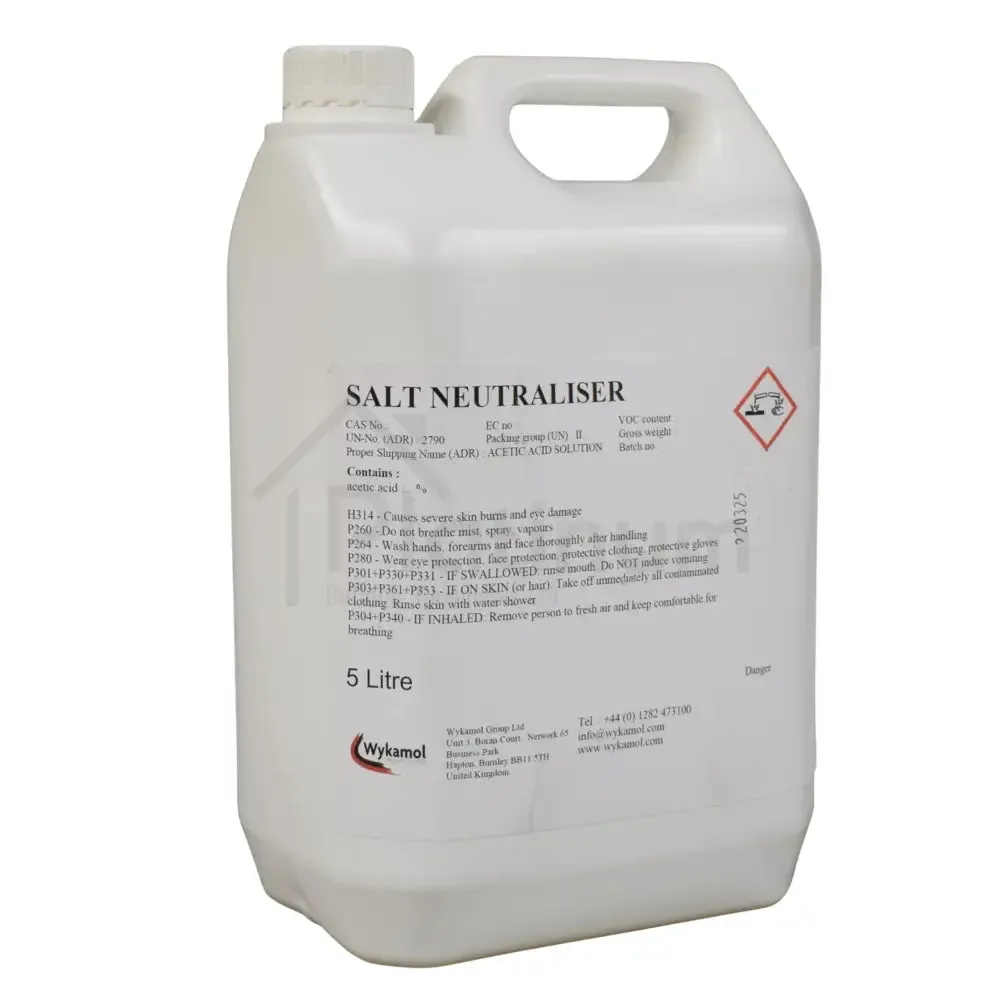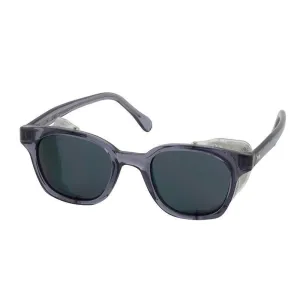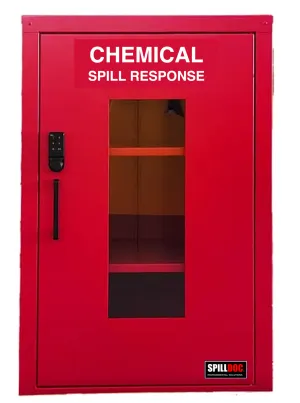Wykamol Salt Neutraliser is a cutting-edge solution, designed to tackle the pervasive issue of salts within mineral building surfaces caused by rising damp. This innovative product, formulated as an aqueous solution with ethanoic acid and enhanced with a surfactant, offers a definitive approach to neutralise the detrimental effects of salts absorbed into masonry and interior plaster due to groundwater.
Also recommended for use after the application of a damp-proof course (DPC), Wykamol Salt Neutraliser acts as a preparatory treatment before re-plastering with salt-resistant materials, ensuring the longevity and integrity of building structures. It is a versatile solution that can be used as a concentrate or diluted, tailored for internal salt issues but also suitable for external masonry preparation.
Description
Wykamol Salt Neutraliser
Wykamol Salt Neutraliser represents a pivotal advancement in the field of building conservation and repair. This specially formulated aqueous solution is based on ethanoic acid and incorporates a surfactant to enhance its efficacy against the challenging problem of salts within mineral surfaces. Rising damp, a common issue in many buildings, leads to the absorption of ground salts into the masonry and interior plaster, compromising structural integrity and aesthetic appeal. Wykamol Salt Neutraliser directly addresses this issue by neutralising harmful salts, thus preventing further degradation.
Upon the removal of affected plasterwork and the implementation of a DPC using products like , , or , Wykamol Salt Neutraliser is applied to the masonry. This is followed by replastering with a salt-resistant product to ensure comprehensive protection against future damage. In instances where a DPC has been executed but residual salts have affected the plaster finish, this product can be directly applied, provided the plaster remains in good condition.
Wykamol Salt Neutraliser is versatile in its application, able to be used as a concentrate or in a diluted form, depending on the severity of the salt contamination. This flexibility makes it an indispensable tool in both preventive measures and in the treatment of existing damage, offering a practical solution that saves time and resources on replastering efforts.
For external applications, while not recommended for existing external salting issues, Wykamol Salt Neutraliser serves as an exceptional preparatory treatment for masonry before the application of protective products such as DrySeal, AquaSolve Pro, or Enviroseal to guard against efflorescence damage. It ensures that surfaces are properly conditioned to receive these protective treatments, maximising their effectiveness.
Product Benefits:
Versatility in Use: Whether used as a concentrated formula or diluted, Wykamol Salt Neutraliser is adaptable to various stages of treatment, catering to both preventative and corrective maintenance of salt damage.
Comprehensive Solution: It addresses the root cause of salt damage by neutralising harmful salts, effectively preventing further degradation of masonry and plaster surfaces.
Time and Cost Efficiency: By mitigating the need for extensive replastering work, this product offers significant savings in both time and expenses associated with building repair and maintenance.
Enhanced Structural Integrity: Regular application post-DPC ensures long-term protection of the building's structural elements, preserving both its functional and aesthetic value.
Preparatory Treatment: Acts as an ideal preparation for masonry surfaces before the application of protective coatings, enhancing their adherence and effectiveness against efflorescence.
Typical Applications:
Post-Damp Proofing Treatment: Applied after the installation of a DPC, Wykamol Salt Neutraliser prepares the surface for replastering with salt-resistant materials, ensuring a durable solution to rising damp issues.
Direct Application to Plaster: In cases where the plaster is still in good condition but affected by residual salts, this product can be directly applied, avoiding unnecessary demolition and replastering work.
External Masonry Preparation: Before the application of protective masonry creams or water repellents, Wykamol Salt Neutraliser can be used to treat and prepare external surfaces, ensuring optimal protection against efflorescence.
Renovation and Restoration Projects: Ideal for use in historical or older buildings where preservation of original materials is crucial, providing a non-invasive method to counteract salt damage while maintaining the integrity of the structure.
Application
When addressing the challenge of salt contamination in your building's masonry and plaster, Wykamol Salt Neutraliser stands as an exemplary solution, meticulously designed to neutralise and mitigate the damage caused by salts due to rising damp.
For effective application, a comprehensive understanding of the process is essential, encompassing substrate suitability, surface preparation, application method, curing & ventilation, coverage, finishing, and cleaning.
The following guidance meticulously outlines each step to ensure optimal use of Wykamol Salt Neutraliser.
Substrate Suitability:
Wykamol Salt Neutraliser is ideally suited for mineral building surfaces that have been compromised by salt contamination. It is applicable to a variety of masonry and plasterwork, provided the surfaces are structurally sound and capable of supporting a damp-proofing treatment.
The product is designed mainly for internal use, targeting areas affected by rising damp and the subsequent salt deposits that may form.
Surface Preparation:
Begin with a thorough examination of the affected area, identifying and brushing away any loose salts present on the masonry.
For masonry surfaces, thoroughly soak the area with clean tap water to prepare the substrate for treatment.
If the original plaster is to be maintained, avoid soaking the plaster finish directly.
Application Method:
Apply Wykamol Salt Neutraliser onto the internal wall showing signs of salt contamination (typically marked by a white band) using a brush or roller for an even distribution.
A single application is generally sufficient; however, areas with heavy salting may require a second treatment for complete neutralisation.
For old, porous brickwork heavily affected by salting, it is advisable to use the neutraliser in its concentrated form.
In contrast, plasterwork or masonry with light salting can be treated with the product diluted with water at a ratio of up to 50:50.
Curing & Ventilation:
Upon application, some frothing or fizzing may occur as the product reacts with the salts. This reaction is normal and indicates the neutralising action is underway. Once the frothing ceases, promptly rinse the wall with water to remove any residual product and solids, which can be brushed off with a stiff brush.
It is crucial to ensure the area is well-ventilated throughout the application and drying process. Open windows and doors to facilitate a thorough draft. In spaces with poor ventilation, wearing an FFP3 mask is recommended, adhering to Health and Safety Executive (HSE) guidelines.
Coverage:
The coverage rate of Wykamol Salt Neutraliser can vary significantly depending on the surface, substrate, and level of contamination.
Typically, 1 litre of concentrate is expected to treat an area between 5m² and 10m².
Assess the condition of the surface beforehand to estimate the necessary quantity accurately.
Finishing:
After the treated area has fully dried from the water wash, re-plastering can proceed. It is paramount to use a suitable re-plastering specification, such as or a sand/cement render containing , to ensure the surface is properly protected against future salt damage.
This step not only secures the structural integrity of the wall but also reinstates its aesthetic quality.
Cleaning:
Following the application, all tools used should be thoroughly cleaned with water.
Proper cleaning ensures the longevity of your equipment and maintains its readiness for future use.
FAQ's
Q) What is Wykamol Salt Neutraliser and how does it work?
A) Wykamol Salt Neutraliser is a highly specialised aqueous solution formulated with ethanoic acid and an added surfactant, designed specifically to combat the issue of salts in mineral building surfaces caused by rising damp. It works by neutralising the harmful salts that are absorbed into masonry and plaster as a result of groundwater contact, thereby preventing further damage and degradation of the building materials. Its action not only addresses the immediate problem of salt contamination but also prepares the surface for further treatment, ensuring a comprehensive approach to building conservation and repair.
Q) Can Wykamol Salt Neutraliser be used on all types of masonry?
A) Yes, Wykamol Salt Neutraliser is versatile and can be applied to a wide range of mineral building surfaces. Whether the building is constructed from brick, stone, concrete, or a mixture of these materials, the product is effective in neutralising salt deposits. It is designed to work on both old and new masonry, making it suitable for use in a variety of situations, from historical buildings needing preservation to newer constructions requiring preventive measures against rising damp.
Q) How should surfaces be prepared before applying Wykamol Salt Neutraliser?
A) Surface preparation is crucial for the effective application of Wykamol Salt Neutraliser. Begin by thoroughly inspecting the affected area for any loose salts and brush them away. Masonry surfaces should then be soaked with clean tap water to ensure the substrate is adequately prepared for treatment. However, if the intention is to preserve the original plaster finish, avoid soaking the plaster directly. This preparatory step ensures that the product penetrates effectively and works efficiently to neutralise the salts.
Q) Is a single application of Wykamol Salt Neutraliser always sufficient?
A) Generally, a single application of Wykamol Salt Neutraliser is sufficient for treating salt contamination. However, in cases of heavy salting or when treating old, porous brickwork that has been severely affected, a second application may be necessary to ensure complete neutralisation of salts. The extent of contamination should be assessed after the initial application to determine if further treatment is required.
Q) How is Wykamol Salt Neutraliser applied?
A) Wykamol Salt Neutraliser should be applied directly to the affected internal wall areas showing signs of salt contamination, identifiable by a white band or efflorescence. Application can be done using a brush or roller, ensuring even coverage across the area. Depending on the severity of the salt contamination, the product can be used either as a concentrate for heavy salting or diluted with water (up to a 50:50 ratio) for light salting.
Q) What should be done if frothing occurs during application?
A) Frothing or fizzing during the application of Wykamol Salt Neutraliser is a normal reaction that indicates the product is actively neutralising the salts. When this occurs, allow some time for the neutralising action to complete. Once the frothing stops, immediately wash the wall with water to remove any residual product and neutralised salts. This step is essential to ensure that the treated surface is clean and ready for the next stage of restoration or prevention.
Q) How important is ventilation during the application of Wykamol Salt Neutraliser?
A) Ventilation is extremely important throughout the application and drying process of Wykamol Salt Neutraliser. Good airflow helps to dissipate any fumes and supports the drying of the treated surface. Windows and doors should be opened to create a thorough draft. In areas where ventilation is poor, it is recommended to wear an FFP3 mask to protect against potential inhalation of any vapours or particles, adhering to Health and Safety Executive (HSE) guidelines.
Q) How long does it take for Wykamol Salt Neutraliser to cure?
A) The curing time for Wykamol Salt Neutraliser can vary depending on the ambient temperature, humidity, and the extent of the salt contamination. Typically, the product should be allowed to react until frothing stops, followed by a thorough rinsing with water. The wall should then be left to dry completely, which can take several days. The exact drying time should be assessed on a case-by-case basis, ensuring the surface is fully dry before proceeding with any replastering or further treatments.
Q) Can Wykamol Salt Neutraliser be used for external salting problems?
A) While Wykamol Salt Neutraliser is primarily recommended for treating internal existing salt problems, it can also be applied to external masonry as a surface preparation before applying protective coatings like or . However, it is not recommended as a standalone treatment for existing external salting issues. Its main role in external applications is to condition the surface, ensuring it is adequately prepared for receiving masonry protection products, which help guard against efflorescence and further salt damage.
Q) What is the coverage rate of Wykamol Salt Neutraliser?
A) The coverage rate of Wykamol Salt Neutraliser can vary significantly depending on the surface texture, porosity of the substrate, and the level of salt contamination. On average, 1 litre of the concentrate is expected to treat an area between 5m² and 10m². It is important to assess the condition of the surface beforehand to accurately estimate the amount of product needed for effective treatment.
Q) Can Wykamol Salt Neutraliser be used directly on plaster?
A) Yes, Wykamol Salt Neutraliser can be applied directly to plaster surfaces that are in good condition but have been affected by residual salts, especially after a damp-proof course (DPC) has been carried out. This direct application helps to neutralise the salts without the need for removing and replacing the plaster, saving both time and resources. However, it is crucial to ensure that the plaster is structurally sound before application.
Q) What should be done after applying Wykamol Salt Neutraliser?
A) After applying Wykamol Salt Neutraliser and allowing it to dry thoroughly, the next step is to address any residual moisture or damage. This often involves replastering the treated area with a suitable replastering specification, such as or a sand/cement render containing . This step is crucial to ensure that the wall is protected against future salt damage and to restore the aesthetic appeal of the surface.
Q) How should tools be cleaned after using Wykamol Salt Neutraliser?
A) All tools used for the application of Wykamol Salt Neutraliser should be cleaned thoroughly with water immediately after use. This includes brushes, rollers, and any other equipment that has come into contact with the product. Proper cleaning prevents the buildup of residues, ensuring that your tools remain in good condition and ready for future use.
Q) Is Wykamol Salt Neutraliser safe to use around pets and children?
A) Wykamol Salt Neutraliser, like any chemical treatment product, should be used with caution, especially in environments inhabited by pets and children. It is advisable to keep both pets and children away from the treated area until the product has fully dried and the area has been ventilated. Always follow the safety guidelines provided with the product for its storage and use.
Q) Can Wykamol Salt Neutraliser be used in conjunction with other damp proofing treatments?
A) Yes, Wykamol Salt Neutraliser is often recommended for use after the implementation of a damp-proof course (DPC), such as with , , or . It acts as an essential follow-up treatment to neutralise any residual salts that may have been absorbed into the masonry and plaster, ensuring comprehensive protection against moisture and salt damage.
Q) What are the environmental considerations of using Wykamol Salt Neutraliser?
A) Wykamol Salt Neutraliser has been designed with environmental considerations in mind. It is a water-based solution, which reduces the environmental impact compared to solvent-based products. However, as with all chemical products, it is important to use it responsibly, following the manufacturer's instructions for disposal of any unused product or containers to minimise any potential environmental impact.
Q) Can Wykamol Salt Neutraliser prevent future salt damage?
A) While Wykamol Salt Neutraliser effectively neutralises existing salt contamination, preventing future salt damage also requires addressing the source of moisture ingress. This often involves installing a robust damp-proof course (DPC) and ensuring proper ventilation. Wykamol Salt Neutraliser plays a crucial role in the treatment process but should be part of a comprehensive damp-proofing strategy to provide long-term protection.
Q) How long after applying Wykamol Salt Neutraliser can replastering commence?
A) Replastering should only commence once the treated area is completely dry from the water wash used post-application and any residual moisture from the original damp issue has evaporated. The drying time can vary depending on the ambient conditions but generally, waiting several days to a week for the area to dry thoroughly is advisable. Assessing the moisture level of the wall before proceeding with replastering is crucial to ensure optimal conditions for the new plaster to adhere and cure properly.
Q) Are there any specific storage requirements for Wykamol Salt Neutraliser?
A) Wykamol Salt Neutraliser should be stored in a cool, dry place away from direct sunlight and extreme temperatures. The product should be kept in its original container, tightly sealed to prevent leakage or evaporation. It is also important to store the product out of reach of children and pets to avoid accidental ingestion or contact.
Q) How does the concentration of Wykamol Salt Neutraliser affect its efficacy?
A) The concentration of Wykamol Salt Neutraliser used directly impacts its efficacy in treating salt contamination. For heavy salting, particularly on old, porous brickwork, using the product as a concentrate is more effective as it provides a stronger neutralising action against the salts. In cases of light salting or when treating sensitive surfaces, diluting the product with water (up to a 50:50 ratio) can still offer effective neutralisation while ensuring the treated surface is not overwhelmed by the solution. The choice of concentration should be based on the severity of the salt contamination and the specific needs of the surface being treated.
Q) Can Wykamol Salt Neutraliser cause damage to the treated surfaces?
A) When used according to the manufacturer's instructions, Wykamol Salt Neutraliser is safe for use on a wide range of mineral building surfaces and is not known to cause damage. It is specifically formulated to neutralise harmful salts without harming the masonry or plaster. However, always conduct a small, inconspicuous patch test before full application to ensure compatibility with the specific surface material.
Q) Is there a best time of year to apply Wykamol Salt Neutraliser?
A) Wykamol Salt Neutraliser can be applied at any time of the year, provided the conditions allow for safe application and adequate drying. However, applying the product during dry, warmer months may facilitate quicker drying and more efficient curing. It's essential to ensure the area is well-ventilated and that ambient conditions do not hinder the product's effectiveness or the drying process.
Q) What personal protective equipment (PPE) should be used when applying Wykamol Salt Neutraliser?
A) When applying Wykamol Salt Neutraliser, it is recommended to use appropriate personal protective equipment (PPE) to minimise exposure to the product. This typically includes gloves to protect the skin, goggles to protect the eyes from splashes, and a mask or respirator (particularly in poorly ventilated areas) to avoid inhaling any vapours or particles. An FFP3 mask is recommended in line with Health and Safety Executive (HSE) guidelines for maximum protection.
Q) How does Wykamol Salt Neutraliser compare to other salt neutralising products on the market?
A) Wykamol Salt Neutraliser stands out in the market for its specialised formulation that includes ethanoic acid and a surfactant, enhancing its ability to effectively neutralise salts within mineral surfaces. Its versatility in application, as both a concentrate and a diluted solution, makes it adaptable to a wide range of conditions and severities of salt contamination. Furthermore, its suitability for use following a damp-proof course (DPC) and before replastering with salt-resistant materials positions it as a comprehensive solution in the field of building conservation and repair. Comparatively, while there are other products available, Wykamol's reputation for quality and its targeted approach to salt neutralisation make it a preferred choice for professionals and homeowners alike.
Q) Can Wykamol Salt Neutraliser be used as a preventative treatment against future salt damage?
A) While Wykamol Salt Neutraliser is primarily designed to address existing salt contamination, its use in conjunction with a proper damp-proofing strategy can indirectly serve as a preventative measure against future salt damage. By neutralising residual salts and preparing surfaces for the application of salt-resistant plasters or coatings, it contributes to a more robust defence against the ingress of salts due to rising damp. However, for comprehensive prevention, addressing the root causes of moisture ingress and ensuring effective damp proofing are essential alongside the use of Wykamol Salt Neutraliser.
Data Sheets






![Burton [AK] Cyclic GORE-TEX Mens Jacket Black Mansfield Topo Burton [AK] Cyclic GORE-TEX Mens Jacket Black Mansfield Topo](https://www.hikezonez.shop/image/burton-ak-cyclic-gore-tex-mens-jacket-black-mansfield-topo_DGueaK_300x.webp)








